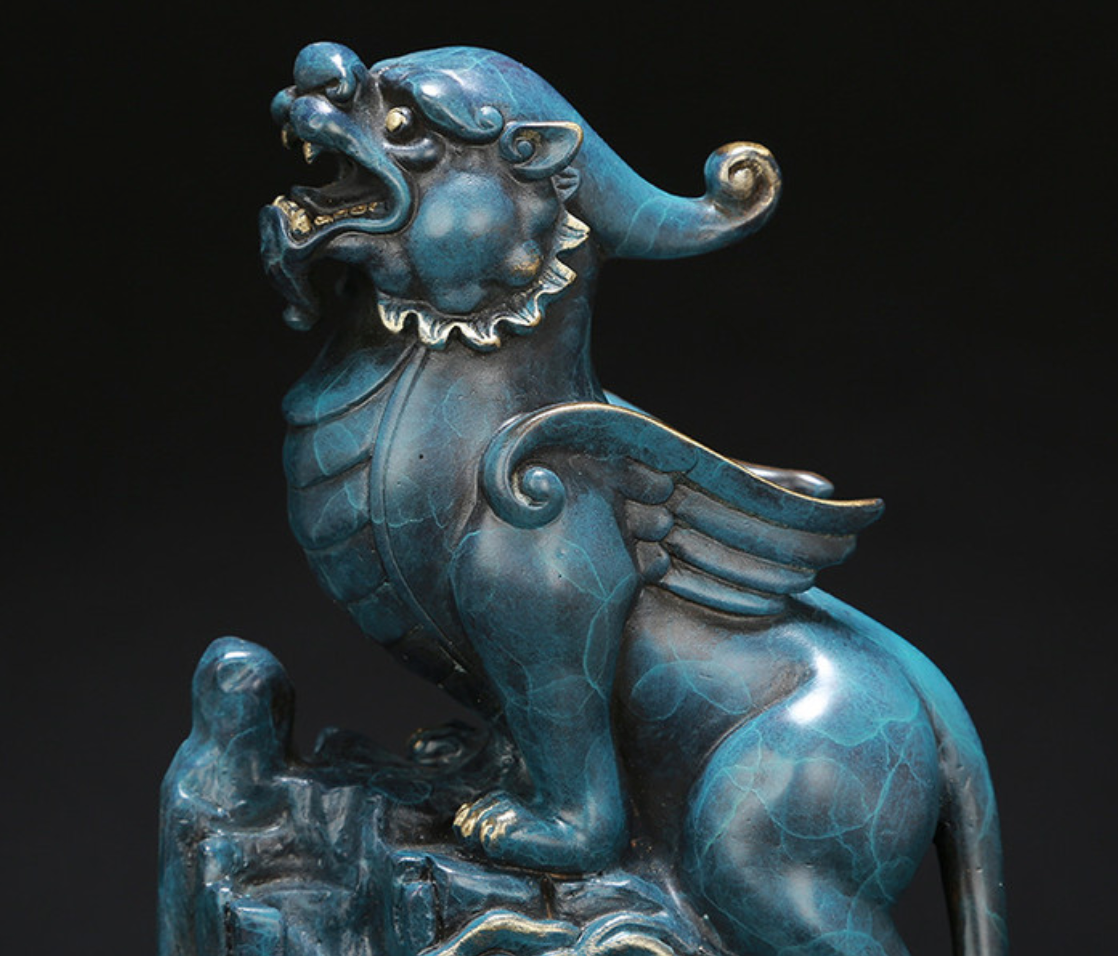Introduction
Pixiu (also known as Pi Yao or Tianlu) is an iconic mythical hybrid creature in Chinese culture and mythology, celebrated for its protective qualities as a winged lion with dragon head features antlers. Pixiu is often depicted with wings to represent protection. Pixiu's importance extends well beyond mere mythology as well - its significance being recognized within Feng Shui practices where it brings good luck, authority and protection to those who display or wear this amulet as amulet.
Origins and Mythological Background
Ancient Mythology
Pixiu, one of nine offsprings of China's ancient Dragon King and an influential figure in ancient Chinese mythology, stands out as an influential and powerful presence. He represents sea, weather and water elements within Chinese folklore and his nine sons have various virtues and powers associated with them; among these was Pixiu who stood out by having an insatiable hunger for gold, silver, and jewels.
One renowned legend depicts how Pixiu defied the Jade Emperor out of greed, defecating in its palace. To punish Pixiu's behavior, the Jade Emperor severed its anus and changed its form into something which only ever consumed wealth without ever losing it again - this mythological event made Pixiu an auspicious creature, symbolic of unlimited wealth accumulation and prosperity. Pixiu became beloved symbol among those seeking financial success and stability due to this transformation tale of Pixiu's punishment and subsequent transformation into an auspicious creature!
Role in Mythology
Pixiu was worshiped not only as an association to wealth accumulation and protection but also as a protector of Heaven, believed to protect against demons and ghosts while maintaining celestial order. Pixiu's connection to one of the nine sons of the Dragon King underlines its role as a symbol of authority and power in ancient China; each son bore distinct traits; Pixiu especially excelled at safeguarding wealth accumulation as well as sacred spaces.
Pixiu has long been recognized for her protective abilities against negative energies, making her a symbol of hope for those seeking its blessings in mythology as well as everyday life.
Historical References
Pixiu is well-established within Chinese culture, evidenced through ancient texts and artifacts. One of the first references to him can be found in The Book of Han, an historical record from Han dynasty China that highlights Pixiu as a sign of prosperity and protection.
Pixiu has long been used as a symbol on military flags and gear, revered by soldiers and generals as it symbolizes bravery, ferocity and protection from evil - making it a potency symbol that gave warriors confidence that victory and protection was on their side in battle.
Cultural and Historical Significance
Role in Feng Shui
Feng Shui considers Pixiu an invaluable symbol of auspicious energy, often placed in homes, offices and businesses to attract wealth and prosperity. Feng Shui practitioners believe its presence helps individuals recover from bad Feng Shui caused by accidentally offending Tai Sui (a powerful deity associated with time and direction).
Position of Pixiu is vitally important in Feng Shui and there are specific guidelines that ensure its powerful energy is harnessed effectively:
- Avoid facing the front door: Pixiu should not face the front door as this area is considered sacred ground and could create energy imbalances that lead to conflict with another god.
- Avoid positioning towards mirrors: Mirrors may make Pixiu nervous and diminish its effectiveness at drawing wealth into one's life.
- Avoid placing against the bed: Positioning Pixiu near your bed may disrupt the calming energy necessary for rest and rejuvenation.
By following these guidelines, believers can maximize the positive effects of Pixiu in their environment, focusing its powerful energy towards wealth creation, protection, and good luck.
Architectural and Artistic Depictions
Pixiu sculptures have long been used in ancient Chinese architecture as symbols of protection and wealth in palaces, tombs, and other notable buildings. Materials used for Pixiu statues vary, each carrying cultural meaning that must be considered.
- Copper: Copper Pixiu sculptures are affordable and widely utilized in Feng Shui practices. Copper is believed to be blessed with strong protective and wealth-attractive powers, making it an excellent material to harness for Pixiu sculptures' protective and wealth-attracting powers.
- Wood: Wood Pixiu sculptures have long been used as house protectors. Wood is an organic material associated with growth and life - which makes it the ideal material to ensure longevity and security in a household.
- Jade: Jade has quickly become one of the go-to materials for creating Pixiu sculptures in modern times, thanks to its auspicious qualities and spiritual significance in Chinese culture. A jade Pixiu may provide maximum protection and wealth accumulation.
Imperial Connection
Pixiu holds great significance to Chinese royalty. During the Han dynasty, Emperor Wu declared it as the "Treasure of the Emperor," signifying its reverence and importance to him and elevating its status to that of a symbol representing imperial authority and power.
Pixiu ownership was once limited to members of the royal family, emphasizing its link with emperor and divine right of rule. Additionally, this arrangement underscored its association with wealth, power, and protection--qualities highly prized amongst ruling class individuals.
Physical Characteristics and Depictions
General Appearance
Pixiu are often depicted with the features of a lion-like body, an antlerless dragon's head, wings and/or antlers; together these elements create an imposing and majestic figure representing strength, protection and authority. There is usually an obvious gender distinction in depicting Pixius; male Pixiu are generally larger in scale.
- Tiānlù (male): Pixiu males are commonly depicted with one antler to signify their role of protecting wealth and drawing it in.
- Bìxié (female): Pixiu females are depicted with two antlers to symbolize their protective abilities and help ward off evil spirits.
Pixiu stands out with protruding eyes, sharp teeth and sometimes even a bifurcated tail; each feature contributing to its fearsome appearance and emphasizing its role as a protector and guardian.
Ancient vs. Modern Depictions
Historical depictions of Pixiu from the Han dynasty often emphasized its gender division into Tianlu and Bixie; however, modern depictions often blur this difference; often being depicted with only one antler while other features become simplified or blended together over time - reflecting changing cultural interpretations while keeping true to its core symbolism.
Distinctions from Similar Creatures
Pixiu stands out among Chinese mythical creatures such as stone lions and qilin, both traditionally seen as protectors of entrances and gates; Pixiu differs due to its unique features - specifically, wings that allow him to fly between Heaven and Earth - making him an effective symbol for wealth, protection, and authority.
Symbolic Meaning of Pixiu
Wealth Attraction
Pixiu symbolizes both financial success and stability through its connection to its primary symbolism: drawing wealth to itself while protecting it. The story of its punishment by Jade Emperor by giving it an anus-tight anus furthers this belief; Pixiu is thought to accumulate wealth without ever losing it, making him a popular emblem for those seeking financial success and stability.
Pixiu, when displayed or worn as an amulet, is thought to bring an endless stream of wealth and prosperity. Its open mouth has often been depicted as "consuming" wealth - providing evidence of continuous attraction to riches.
Protection
Beyond its role of wealth attraction, Pixiu serves as an effective guardian against negative energy. Chinese culture practice places significance in wearing an amulet with Pixiu or placing statues strategically around homes and businesses to ward off harmful influences such as bad luck and negative energies. With its fierce appearance and connection to the Dragon King adding further protection and peace of mind for those seeking security.
Authority and Power
Pixiu, with its dragon-like features, symbolizes authority and power; historically associated with emperors and high-ranking officials. This creature symbolizes control, dominance and the ability to ward off misfortune - features widely associated with rulers who look upon Pixiu as an emblem that enhances leadership qualities while increasing chances of success in any endeavor. For this reason, many who hold positions of power choose this emblem as part of their badge of office - particularly among emperors themselves!
Good Luck
Pixiu is believed to bring good fortune and positive energy to those who embrace it, be it jewelry or sculpture form. By wearing or displaying Pixiu as part of their daily lives, people who embrace its significance may increase their chances in various aspects such as career advancement, relationship management and health improvement. Due to its association with good luck, this symbolism makes Pixiu a popular symbol among those looking to improve their fortune and overall wellbeing.
Benefits of Wearing a Pixiu Bracelet
Attracting Wealth and Prosperity
Pixiu bracelets have long been worn as symbols of financial success and abundance, particularly by businesspeople, investors, and those hoping to enhance their financial status. Wearers believe these bracelets harness Pixiu's power of drawing wealth towards them so as to experience greater prosperity and growth financially.
Protection from Negative Energies
Pixiu bracelets are widely considered protective talismans that help shield wearers from negative energies, evil spirits, and bad luck. Their wearers also report increased levels of positivity in their lives as the bracelet acts like an aura shield against negative influences that threaten well-being - one reason why Pixiu bracelets are popular among those seeking safety and security in daily life.
Enhancing Personal Power and Authority
Pixiu bracelets have long been associated with increasing confidence, assertiveness and personal power in wearers. By wearing one, individuals may gain more leadership qualities as well as navigate challenges more effectively - making this jewelry choice especially popular with those in positions of authority or those looking to achieve leadership positions.
Promoting Good Luck
Pixiu bracelets are known for attracting good luck and positive outcomes in various aspects of life - be it business, relationships or health. Wearers of Pixiu bracelets may experience greater success and fulfillment in all areas.
Improving Feng Shui
Pixiu bracelets can also be used in Feng Shui practices to increase auspicious energy and balance its flow throughout an individual's life. By donning one, one can promote harmony and prosperity ensuring their environment supports their goals and well-being.
Conclusion
Pixiu stands as an embodiment of protection, wealth attractor, authority and good luck - an undeniable legacy in Chinese mythology, culture, Feng Shui, symbolism and iconography that continues today. From decorative pieces to amulets - Pixiu continues to offer protection, prosperity and positive energy when welcomed as part of one's everyday routine.
At KarmaBless, we recognize the immense significance of including powerful symbols like Pixiu into everyday life. Our spiritual jewelry is handcrafted using precious gems and ancient crystals that resonate with their energy and intent - our creations not only serve as beautiful accessories but can help reduce anxiety by grounding you in present moment awareness.
KarmaBless' dedication to quality and spiritual integrity ensures that every piece from us becomes more than mere jewelry: each is designed as an invaluable companion on your path towards wellness and inner peace. We work to fulfill the needs of individuals seeking balance and harmony by offering products which reflect their personal values and aspirations.










